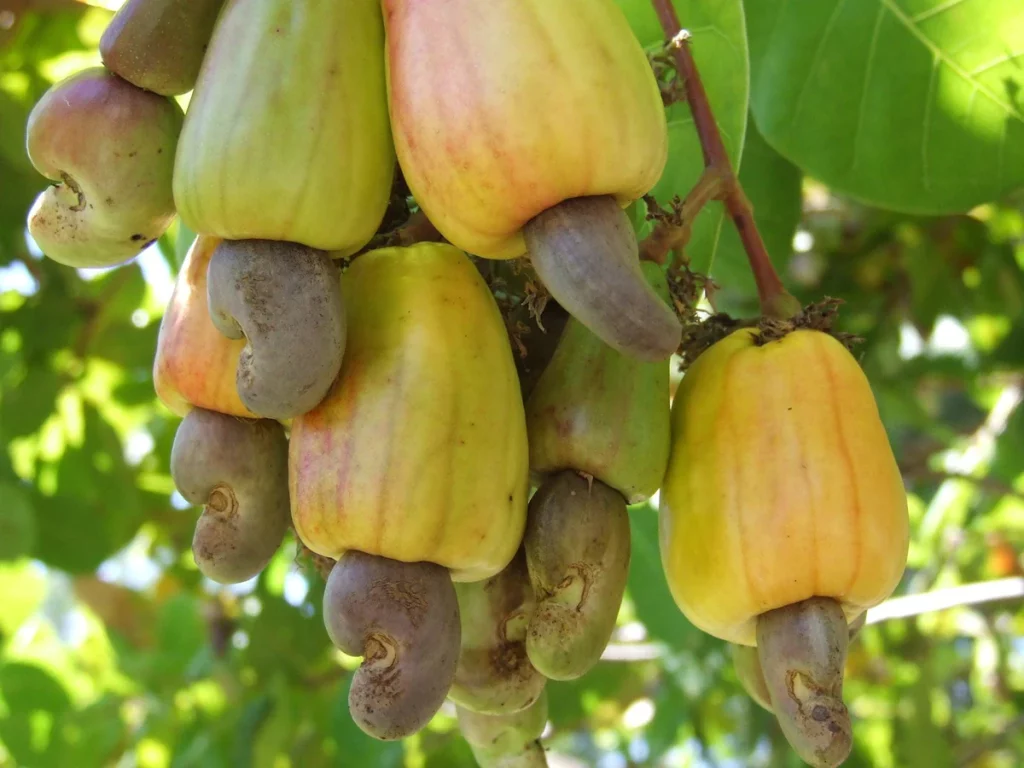Are you one of those that ever thought or still thinks cashew nuts were artificially made? Have you ever asked the question “where do cashew nuts come from?”. This read will tell you all you need to know.
Cashew nuts, scientifically known as Anacardium occidentale, originate from the cashew fruit, which thrives in tropical regions with warm climates.
This intriguing fruit is native to Brazil, but it has since been embraced by various countries, leading to its cultivation in regions spanning from Asia to Africa.
The cashew fruit presents a curious peculiarity – it bears both the nut and the cashew apple, a juicy, pear-shaped fruit that boasts a tangy and refreshing taste.
While the cashew apple is cherished in some cultures, it’s the nut that has truly captured worldwide attention.
What plant do cashew nuts come from?

Cashew nuts come from the cashew tree (Anacardium occidentale). The cashew tree is a tropical evergreen tree native to northeastern Brazil but is now cultivated in various tropical regions around the world.
The cashew nut itself is the seed that grows at the end of the cashew apple, a fleshy and juicy fruit produced by the cashew tree.
Importance of eating cashew nuts
- Nutrient Rich: Cashew nuts are packed with essential nutrients, including vitamins (such as B vitamins and vitamin E), minerals (like magnesium, zinc, and phosphorus), and healthy fats.
- Heart Health: The monounsaturated and polyunsaturated fats in cashews can contribute to heart health by helping to lower “bad” LDL cholesterol levels.
- Weight Management: Despite being calorie-dense, cashews can aid in weight management due to their protein and fiber content, which can help you feel full and satisfied.
- Bone Health: Cashews contain minerals like calcium, magnesium, and phosphorus, which are crucial for maintaining strong and healthy bones.
- Brain Function: Rich in magnesium, cashews support healthy brain function and can contribute to better cognitive performance.
- Antioxidant Properties: With antioxidants like vitamin E and selenium, cashews can help protect cells from oxidative damage and contribute to overall well-being.
- Blood Sugar Control: Cashews’ combination of healthy fats, fiber, and protein can help regulate blood sugar levels, making them a good snack option for individuals with diabetes.
- Skin Health: The vitamins and minerals in cashews, along with their healthy fats, can promote skin health by supporting collagen production and skin elasticity.
- Immune Support: Cashews contain zinc, which plays a vital role in maintaining a healthy immune system and aiding in wound healing.
- Nutrient Absorption: The healthy fats in cashews can help enhance the absorption of fat-soluble vitamins (like vitamin A and vitamin D) and other nutrients from the foods you consume.
The bottom line
In tracing the origin of cashew nuts, we unveil a captivating journey from the heart of tropical regions. From the cashew plant in the beginnings in the vibrant landscapes of Brazil to their global embrace across continents, cashew nuts stand as a testament to nature’s bountiful offerings.
With their intriguing combination of the prized nut and the refreshing cashew apple, these nuts have secured their place as a culinary delight that bridges cultures and tantalizes taste buds worldwide.
